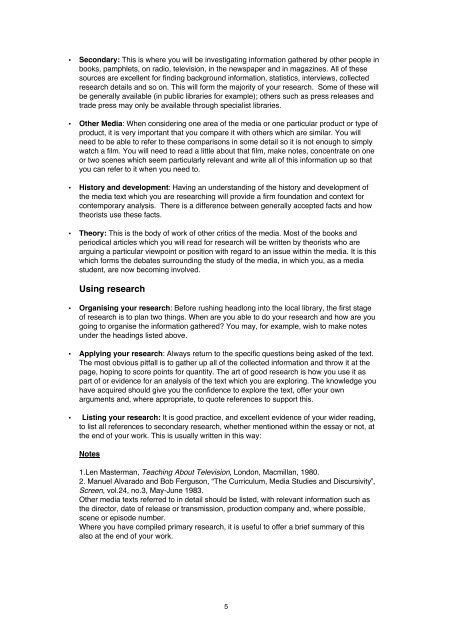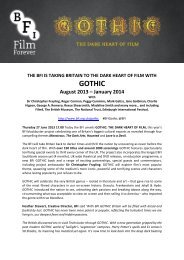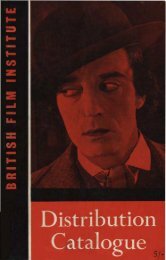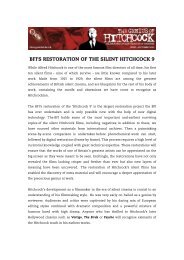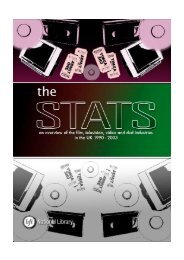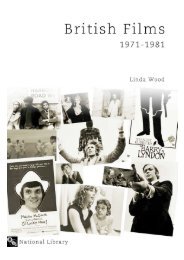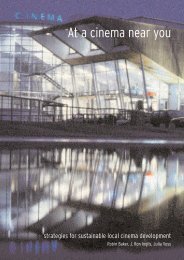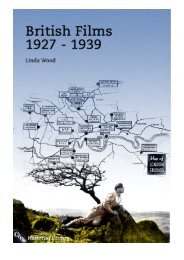16 + GUIDE - British Film Institute
16 + GUIDE - British Film Institute
16 + GUIDE - British Film Institute
Create successful ePaper yourself
Turn your PDF publications into a flip-book with our unique Google optimized e-Paper software.
• Secondary: This is where you will be investigating information gathered by other people in<br />
books, pamphlets, on radio, television, in the newspaper and in magazines. All of these<br />
sources are excellent for finding background information, statistics, interviews, collected<br />
research details and so on. This will form the majority of your research. Some of these will<br />
be generally available (in public libraries for example); others such as press releases and<br />
trade press may only be available through specialist libraries.<br />
• Other Media: When considering one area of the media or one particular product or type of<br />
product, it is very important that you compare it with others which are similar. You will<br />
need to be able to refer to these comparisons in some detail so it is not enough to simply<br />
watch a film. You will need to read a little about that film, make notes, concentrate on one<br />
or two scenes which seem particularly relevant and write all of this information up so that<br />
you can refer to it when you need to.<br />
• History and development: Having an understanding of the history and development of<br />
the media text which you are researching will provide a firm foundation and context for<br />
contemporary analysis. There is a difference between generally accepted facts and how<br />
theorists use these facts.<br />
• Theory: This is the body of work of other critics of the media. Most of the books and<br />
periodical articles which you will read for research will be written by theorists who are<br />
arguing a particular viewpoint or position with regard to an issue within the media. It is this<br />
which forms the debates surrounding the study of the media, in which you, as a media<br />
student, are now becoming involved.<br />
Using research<br />
• Organising your research: Before rushing headlong into the local library, the first stage<br />
of research is to plan two things. When are you able to do your research and how are you<br />
going to organise the information gathered? You may, for example, wish to make notes<br />
under the headings listed above.<br />
• Applying your research: Always return to the specific questions being asked of the text.<br />
The most obvious pitfall is to gather up all of the collected information and throw it at the<br />
page, hoping to score points for quantity. The art of good research is how you use it as<br />
part of or evidence for an analysis of the text which you are exploring. The knowledge you<br />
have acquired should give you the confidence to explore the text, offer your own<br />
arguments and, where appropriate, to quote references to support this.<br />
• Listing your research: It is good practice, and excellent evidence of your wider reading,<br />
to list all references to secondary research, whether mentioned within the essay or not, at<br />
the end of your work. This is usually written in this way:<br />
Notes<br />
1.Len Masterman, Teaching About Television, London, Macmillan, 1980.<br />
2. Manuel Alvarado and Bob Ferguson, “The Curriculum, Media Studies and Discursivity”,<br />
Screen, vol.24, no.3, May-June 1983.<br />
Other media texts referred to in detail should be listed, with relevant information such as<br />
the director, date of release or transmission, production company and, where possible,<br />
scene or episode number.<br />
Where you have compiled primary research, it is useful to offer a brief summary of this<br />
also at the end of your work.<br />
5


